Leading the charge: Jones, Wilson help steer COVID-19 command team
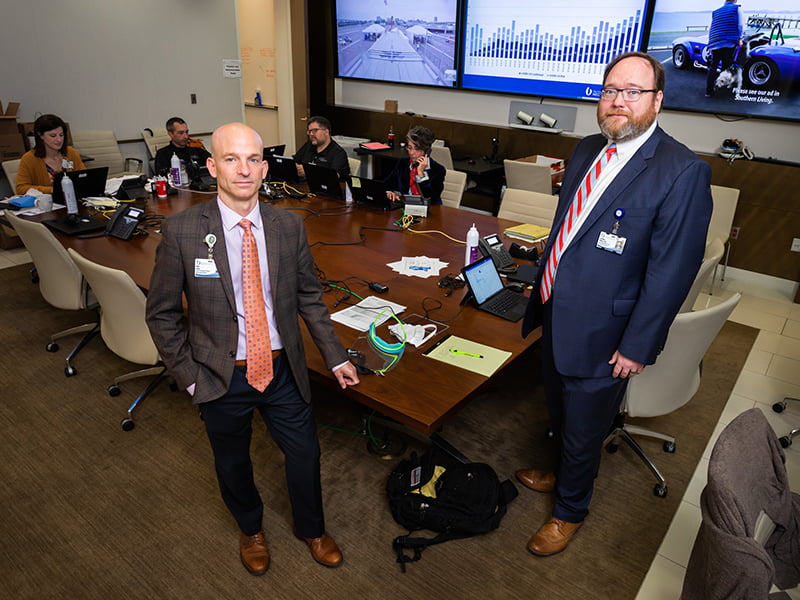
As Mississippi continues to grapple with the COVID-19 pandemic, a prominent emergency medicine physician is teaming with a key administrator and emergency operations veteran to help lead the response at the University of Mississippi Medical Center.
Dr. Alan Jones, professor and chair of the Department of Emergency Medicine, and Dr. Jonathan Wilson, the Medical Center’s chief administrative officer, are critical members of the incident command team leading UMMC’s operations to combat the highly contagious novel, or new, coronavirus.
The incident commander is Dr. LouAnn Woodward, vice chancellor for health affairs and dean of the School of Medicine. Jones serves as the clinical response leader, while Wilson is incident manager.
The three are top decision-makers on the strong COVID-19 response expected of academic medical centers. At UMMC, that includes innovations that are far from the norm during this pandemic: clinical research and trials on how to treat the disease, researchers’ creation of an in-house COVID-19 laboratory test and a pediatric anesthesiologist’s invention of an emergency-use ventilator.
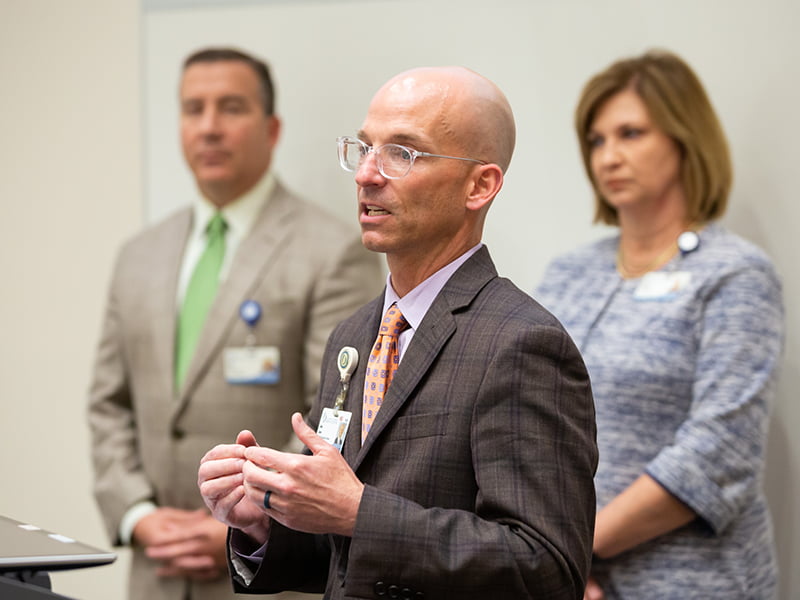
Jones and Wilson are drawing on their combined expertise in handling large-scale emergencies to shepherd operations to address a pandemic that will affect Mississippi for months to come. Whether it’s coordinating COVID-19 testing in the state’s rural corners or making sure patients in the UMMC neighborhood and beyond get the care they need, the two are leading the charge in exhaustive planning and implementation.
“By virtue of the training we’ve had and what we do every day, we are used to preparation and scaling for the surge of patients, and for appropriate utilization of resources,” said Jones, a Millsaps College graduate who today lives near the Northeast Jackson home of his parents, Edward and Lynn Jones.
“I’ve lived through several incidents – tornadoes, a pedestrian bridge collapse at a NASCAR race, plane crashes,” Jones said. “I’ve had the opportunity to be involved in mass casualty events and to understand the process.”
Jones is a 1999 graduate of the University of Mississippi School of Medicine. He completed a residency in emergency medicine, followed by a clinical trials research fellowship, at Carolinas Medical Center in Charlotte, North Carolina. He also holds a Master of Public Health degree from the University of North Carolina-Charlotte.
Jones joined the UMMC emergency medicine faculty in 2011 and has served as Department of Emergency Medicine chair since 2013. His research interests include sepsis, life-threatening infections and critical care.
Wilson was appointed chief administrative officer in 2014 and previously served as director of emergency services. He received his master of science in nursing in 2011 and earned a doctor of philosophy degree in 2017 at the University of Mississippi School of Graduate Studies in the Health Sciences.
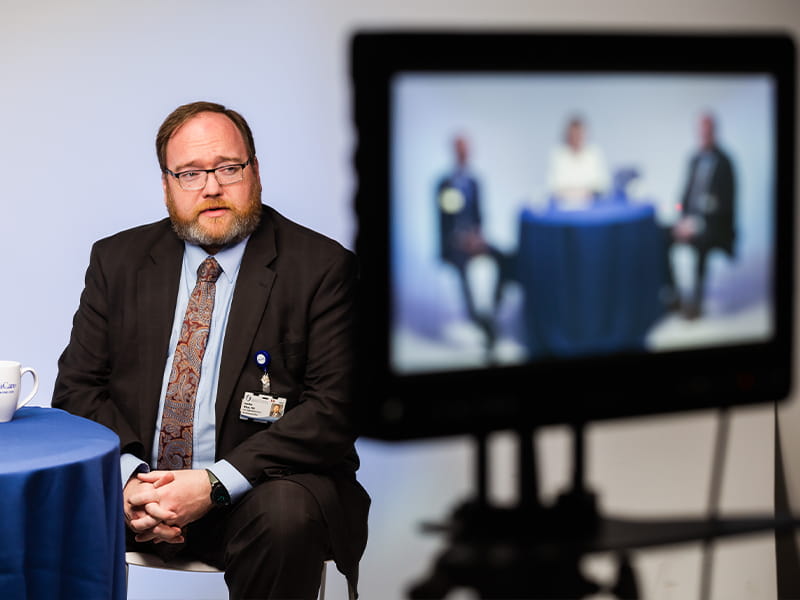
His research interests are civilian disaster health care response systems, pre-hospital care and aeromedical transport.
Jones and Wilson take part in regular tabletop exercises that simulate how the hospital will scale up its emergency response and manage a higher patient load during a disaster. The Medical Center also has regular drills for scenarios ranging from a campus shooting to a large-scale fire.
Such experiences “have helped me to think quickly on my feet and to rapidly recognize high-risk areas that need immediate attention,” Jones said “It has helped me to prioritize work to make sure we have a tiered approach to planning.”
Ironically, Wilson said, UMMC in late January was scheduled to take part in a tabletop drill with the leadership of the Mississippi State Department of Health. The exercise had been scheduled since summer 2019.
The scenario: a pandemic.
“About halfway through the drill, we said: ‘Why don’t we shift this from hypothetical to actual?’ “ Wilson said. “We quickly changed gears and started our own planning process. We activated the Medical Center’s incident plan, and formally started tracking the virus and trying to learn about the enemy.”
Jones and Wilson, along with the incident command, watched as the virus moved from the Korean peninsula to Iran. “When it moved into Italy, that was the first impression we had of how a similar health care system would deal with this particular disease,” he said of those days in mid- to late February.
“It was much like we have been preparing for since H1N1,” Wilson said. Also known as swine flu, the H1N1 flu pandemic swept across the globe in 2009. Like COVID-19, H1N1 was a new virus.
“It was one of our first looks at what a novel-type virus might look like. You learn in Mississippi that when a tornado comes, you get on the ground floor, but when it hits, it’s a whole lot different than you prepared for.
“It was the same way with this virus. You can go through the planning process, but it’s different when you make first contact with the enemy.”
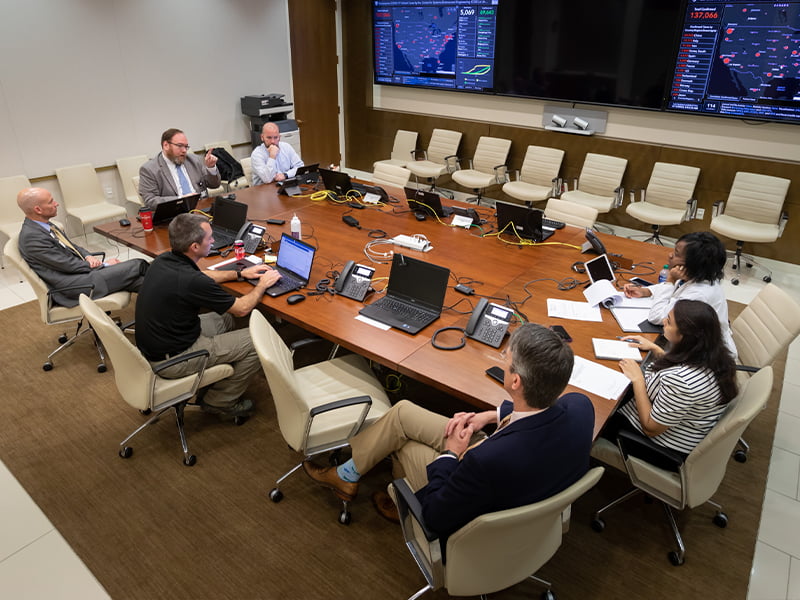
As the Centers for Disease Control and Prevention and the World Health Organization issued guidelines – and revised them – the Medical Center tailored its response.
Jones, Wilson and other leadership team members took critical steps to keep both patients and hospital staff safe. That included making sure front-line clinical staff were prepared for a rush of patients and adept at using personal protective equipment, or PPE, such as face masks, face shields, gowns and gloves.
They took part in formulation of policies that required students and employees who traveled over spring break to quarantine for two weeks. They worked with the Medical Center’s infectious diseases team to create procedures for screening patients for the virus and keeping tabs on how many negative pressure rooms, designed to keep contaminated air from escaping, were available for COVID-19 patients.
They prepared the best they could to be ready for anything, and to remain steadfast in accomplishing their goals for caring for the sickest of the sick, and continuing a robust statewide response.
As large cities throughout the country were overwhelmed with seriously ill and dying COVID-19 patients, UMMC focused on its readiness. Jones and Wilson worked long hours, and although their days are often shorter now, they still maintain around-the-clock vigilance.
“You have to lead by example. You can’t ask or expect people to contribute in a way that is different without being right there alongside them,” Jones said. “It’s important to acknowledge that exhaustion is real, and that people need breaks.”
Like most front-line staff, the two have made many sacrifices since January. “My family has been extraordinarily understanding and accommodating during this time,” Jones said of wife Reagan and sons Blake, 15, and Ben, 13.
His children are students at Jackson Academy; Jones is a member of the school booster club and has recorded podcasts for the Jackson Academy family to give them valid and honest information about the pandemic.
“I’m just a normal person whose happens to have a job that has been ramped up at this time,” Jones said. “I’m fortunate that I didn’t lose my job, and that I’m able to contribute in a meaningful way to prepare our state for the virus.”
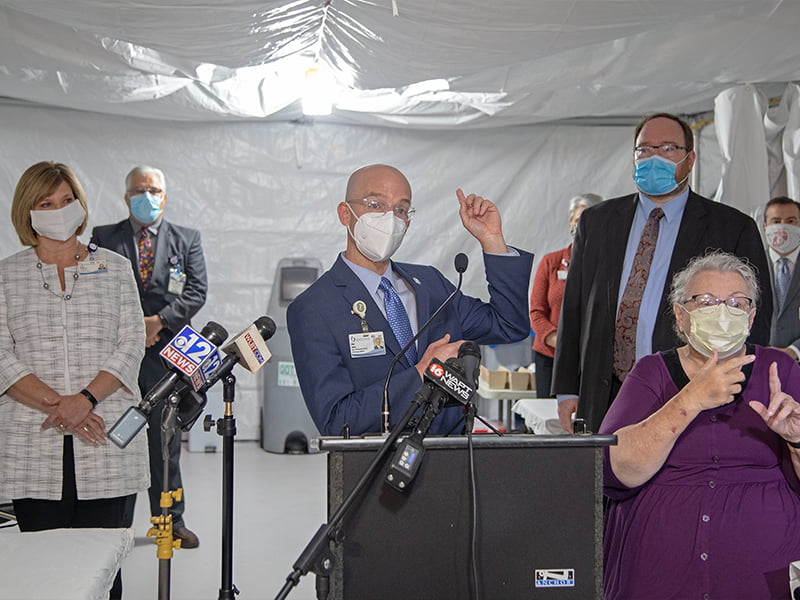
“The lion’s share of me being able to function professionally is all due to my wife taking care of everything on the home front – our little girl, and all the day-to-day things that I can’t focus on. She is my rock,” said Wilson, a Brandon resident. He and wife Cristy are parents to Ella Grace, who is about to turn 2.
Ella Grace is asleep when Wilson leaves for work, “but I try to find time during the day to FaceTime or video chat with her,” he said. “Being home with my family is my way of recharging, but I haven’t had a lot of time for any hobbies.”
Just as their families hold them up, their UMMC family has given them strength.
“We’ve got a core team of leaders who are very strong, and our Mississippi Center for Emergency Services has some of the best people in the country,” Wilson said.
Jones and Wilson are committed, just as they were in the first weeks of the Medical Center’s response, to being as transparent as possible about the processes, policies and preparation for the pandemic.
“One of the fears associated with new events is the unknown,” Jones said. “We were able to communicate a clear, calm message, the mitigation plans we had prepared, and where we were nervous or needed help.
“That went a long way toward calming the fears and nerves of the people in the UMMC community, and in our community as a whole.”
Although Mississippi has loosened restrictions on business closings and residents’ ability to interact in public, Jones and Wilson remain committed to promoting precautions that, hopefully, will inhibit the virus from roaring back. That includes social distancing, meticulous hand-washing, wearing facemasks and staying home and isolating if sick.
“Our top priority has been, and will remain, protecting our faculty, staff and students as well as our patients and visitors,” Wilson said. “We have to be vigilant for the next wave in the fall or winter, when we have the risk of the coronavirus coming back in addition to seasonal flu.
“We can’t let our guard down.”


